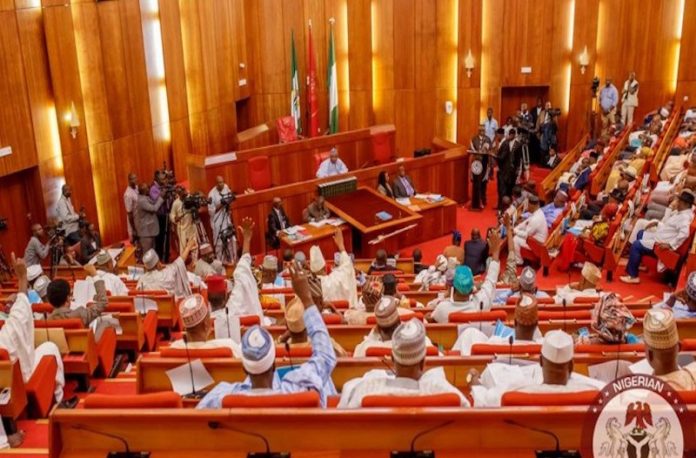Senate on Wednesday unanimously confirmed deputy governors of the Central Bank of Nigeria (CBN), Mrs Aishah Ahmad and Mr Edward Lametek Adamu for another tenure
The confirmation was sequel to the consideration of Senate committee on Banking, Insurance and Financial Institutions chaired by Senator Sani Uba.
Presenting the report for consideration, Senator Uba said the nominees’ appointment was in line with the CBN Act and that they pocesed relevant academic qualifications
He said that the committee did not receive any petition against them and they also scaled through the screening of relevant security agencies.
It would be recalled that Ahmad and Adamu were first appointed as CBN deputy governors in charge of the Financial System Stability and Corporate Services Directorate respectively in March 2018.
President Buhari, in a letter earlier addressed to the Senate President Ahmad Lawan asked the Upper Chamber to confirm their nominations in the “usual expeditious manner.”
According to the letter, Aishah Ahmad as Deputy Governor in charge of Financial System Stability, she is responsible for leading the effort to promote a sound financial system in Nigeria; one of the principal objects of the Bank as specified within the CBN Act.
In this role, Aishah is a member of the Governing Board and Committee of Governors at the CBN and Chairman, of the Financial Institutions Training Centre (FITC) – a not-for-profit organization offering training, consulting and research services for the financial services sector.
Her banking and investment career spans several financial institutions including NAL Bank Plc, Zenith Bank Plc and Stanbic IBTC Bank Plc, amongst others.
Also Edward Adamu began his career in the Unified Public Service (UPS) in 1983 with the Bauchi State Civil Service.
He spent thirty-five (35) years in the UPS, twenty-five (25) of which was spent in the Central Bank of Nigeria (CBN).
During his years in the Central Bank, he was seconded to the Gombe State Civil Service from 2008 to 2010 as the Senior Special Assistant and Head, Procurement Management and Due Process Office.
He returned to the CBN in 2010 and was appointed Director of the Strategy Management Department in 2012, after a selection process.
He was later deployed to the Human Resources Department of the Bank in 2016 as Director, a position he held until his retirement from the services of the Bank on 14th February 2018.
President Muhammadu Buhari’ had sought the approval of Senate for renewal of tenure of Both Mr Edward and Mrs Ahmad.
Redesigned naira released for public use Dec.15
…….Policy led to capital appreciation—–Shareholder
The redesigned naira notes will be released for public use Thursday December 15, by the Central Bank of Nigeria (CBN).
CBN Godwin Emefiele, had on October 26, 2022, announced that new naira notes would be introduced to replace the current 200, 500, and 1,000 naira notes.
It is believed that the development will have positive impact in the nation’s economy and promote the cashless policy initiative of the CBN.
Speaking with Daily Champion, National Co-ordinator, Pragmatic Shareholders Association of Nigeria, Mrs. Bisi Bakare was of the view that the only way the naira redesigning may have added value to shareholders is in terms of capital appreciation.
According to her, some money bags may have used their old currency to buy stock through their stock broking firms by paying in cash as they may not want to take volume of cash to the bank.
She however, commended the cashless policy initiative of the CBN.
The CBN Governor, recently disclosed that about N1 trillion of the old notes has been returned to the banking system following the introduction of new naira notes.
Emefiele disclosed this while responding to questions from State House reporters after briefing President Muhammadu Buhari on developments in the Nigerian economy, in Daura, Katsina State.
CBN had earlier announced that the new notes will be released for public use on December 15. The new notes will circulate alongside the old notes until January 31, 2023, when the old notes would cease to be legal tender.
The CBN on Tuesday, December 6, further issued a directive to commercial banks and financial institutions limiting withdrawals for individuals and corporate organisations to N100, 000 and N500, 000, respectively.
Addressing journalists in Daura, Emefiele said a lot of electronic channels had been put in place in 10 years since the cashless policy was launched in 2012 to aid people in conducting banking and financial service transactions in Nigeria.
He said the cashless policy was stepped down on a number of occasions to fully prepare for its implementation, to deepen payment system infrastructure in Nigeria.
“I can only just assure you that it will go round, let us just be calm. Luckily the old currency continued to be legal tender till January 31, 2023. So, I want to crack a joke, both the painted (new notes) and unpainted (old notes) will operate concurrently as a legal tender. But by January 31, the unpainted one will not be useful to you again, so please take it to your bank as quickly as possible,” he added.
Emefiele said “about N1 trillion” of the old notes had been returned to the banking system.
Reacting to the Senate’s opposition to the withdrawal limit, he said: “The Senate of the Federal Republic is National Assembly. They are the legislative arm of the government and from time to time, we brief them about what is happening and about our policies and I am aware that they have asked for some briefings and we will brief them.























